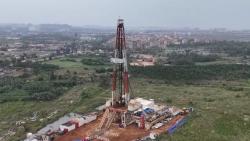China's Deepest Geothermal Well Now Ready for Operation

China's Fushenre-1 geothermal well, now complete at a remarkable depth of 5,200 meters, is set to make significant strides in renewable energy initiatives and carbon reduction efforts. This milestone underscores China's ongoing commitment to harnessing underground energy sources.
Situated in Hainan province, this geothermal well penetrates a granite formation that dates back an impressive 250 million years. This ancient geological structure has proven to be a promising site for uncovering renewable energy.
In this deep geological layer, researchers have found geothermal resources with temperatures surpassing 188 degrees Celsius. This discovery highlights the potential for tapping into substantial renewable energy reserves in the region.
Geothermal energy is recognized as a stable and low-carbon renewable resource, noted for its vast reserves and distributed potential. Guo Xusheng, chief geologist at Sinopec, emphasized these benefits in the context of China's energy strategy.
Following successful drilling operations in April, Sinopec has effectively fractured the surrounding rock, permitting cold water injection to extract thermal energy. The well is now poised to evolve into a research platform aimed at industrializing high-temperature geothermal resources.
Historically, China's utilization of geothermal resources has focused on shallow and medium-depth applications. However, Sinopec has already made advancements with nearly 100 million square meters dedicated to geothermal heating.
In addition to this well, Sinopec has undertaken various regional geothermal heating projects, positioning itself as a leader in the adoption of geothermal technologies. The Fushenre-1 well could pave the way for further developments in this sector.
Read These Next

Haiti Faces Health Emergency as Gang Violence Intensifies
Gang violence in Haiti worsens health emergency, impacting healthcare access and raising safety concerns for medical assistance.

Europe and China to Gain from US Scientist Migration
U.S. scientists may relocate to Europe and China due to budget cuts and regulations, boosting research in those regions.

China Weekly News Quiz September 15 to 21 2025
Test your knowledge of recent China events with our weekly quiz, featuring important stories from the past week.
